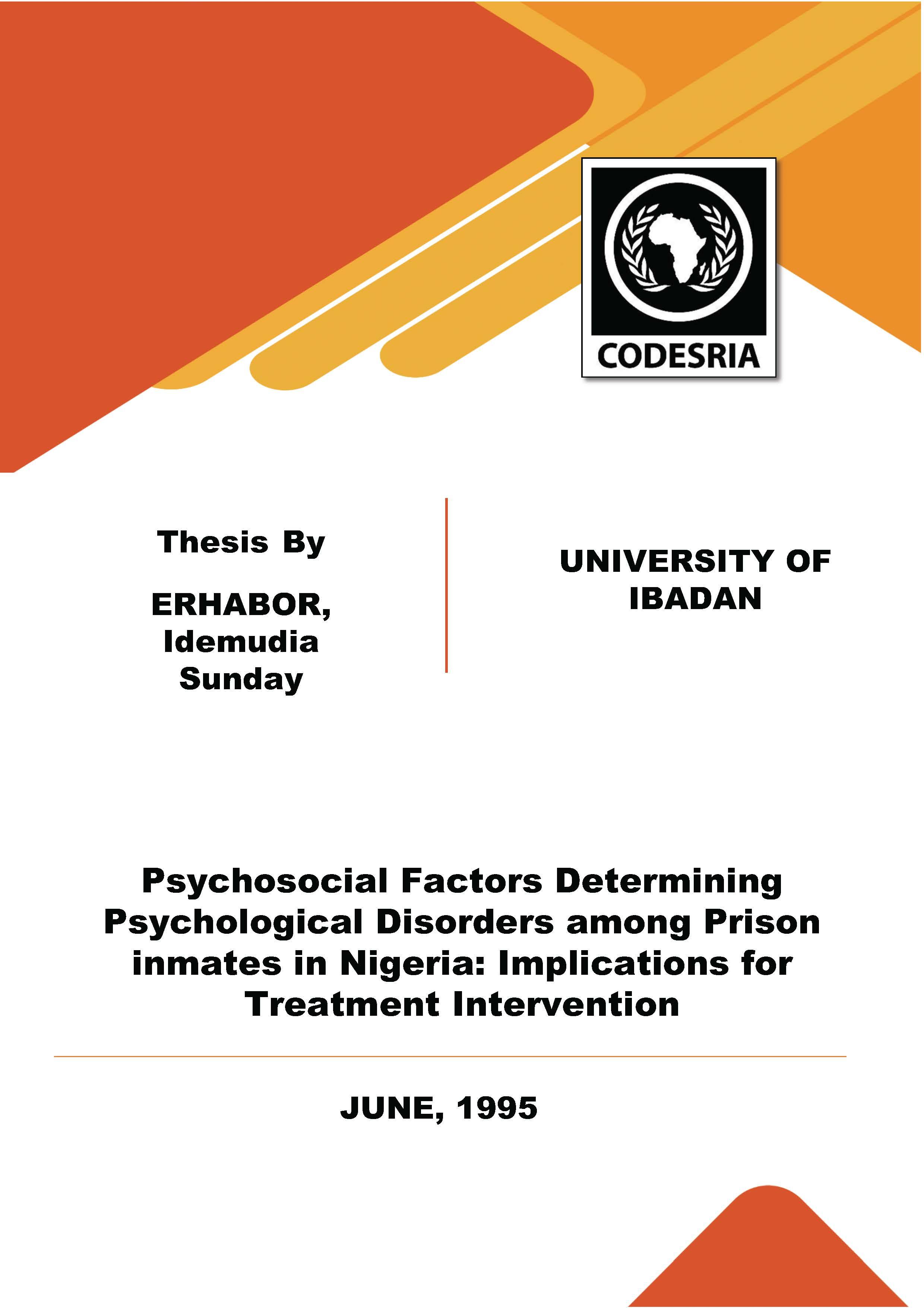Psychosocial Factors Determining Psychological Disorders among Prison inmates in Nigeria: Implications for Treatment Intervention
Mots-clés :
Les prisonniers, psychologie, Loi criminelle, facteurs psychosociaux, désordres psychologiques, NigeriaSynopsis
Cette étude a été conçue pour évaluer le rôle des variables psychosociales dans la détermination des troubles psychologiques chez les prisonniers, au Nigeria et initier un programme d'intervention de traitement psychologique à utiliser chez les prisonniers ; Échantillonnage stratifié. a été utilisé pour sélectionner quatre prisons de taille moyenne au Nigeria. Il s'agissait des prisons de Kaduna, Agodi, Benin et Enugu. À l'aide d'une table de nombres aléatoires, 150 détenus ont été sélectionnés en majorité dans les quatre prisons et 150 autres non-détenus dans la population générale ; En outre, 211 détenus ont participé au programme de traitement à la prison d'Agod_i, à Ibadan. Ceux-ci ont été assignés au hasard aux groupes expérimentaux et témoins. Les données étaient.recueillies à l'aide du questionnaire d'inventaire de personnalité (PIQ), comprenant le questionnaire de personnalité d'Eysenck (EPQ), Awaritefe · Psychological.- Index (API), le Crown Crisp Experiential Index (CCEI) et l'échelle de stress en prison ldemudia (IPSS). Neuf hypothèses ont été testées dans cette étude...
Téléchargements
Références
Abrahamsen, N •. (1960) The Psychology of Crime. New York; Columbia University Press.
Abrams A. and Siegel L.M. (1978) The Transidential meditation programme and reformation at Folson State Prison. A cross-valuational study. Journal of Criminal Justice and Behaviour; 5(1) 3-20.
Adedokun, A. (1968) Cited in Civil Liberty Organization ( 1991) Behind the Walls: A report on Prison Condition in Nigeria and the Nigerian Prison System. Lagos., C. LO Publications.
Adeola, I.O.A.(1988) Living.Conditions of inmates of Ado-Ekiti Prison. Unpublished Seminar paper Faculty·,of the Social Sciences, Ondo State University Ad lola, 1.0.A. (1992) Personnel Management in Ado-Ekiti prisons.
African Journal of Sociology !., 1-11.
Adeyemi, A. A ( 1968) Sentences of imprisonment, objectives, trends and efficiency. In Ellias T'. 0. Beds) The Prison System in Nigeria. •O'iifset Process, University of Lagos Library.
Adler, H.M. (1927) Biological and Pathological aspects of behaviour disorders. American Journal of Psychology, ?_, 507-515.
Agua, B. and Allen, T. E. (1983) The effect of parole notification on somatic symptoms in Federal prisons. Corrective Psychiatry, ,!!, 61-67.
Aitman, B. (1967) Cited Mgbemena, N.J. (1983) Psychological factors of imprisonment. Unpublished M.Sc dissertation. Benin. University of Benin.
Akinnawo, E.O {1993) Prevalence of Psychopathol gical symptoms in a· Nigeria prison Psychopathologie Africaine XXV, (1} 93-104. ·
Allport, G. W. (1937) Personality: A psychological interpretation. Holt, Reinehart and Winston.
....................................................................................................
Bottoms, A.E (1972) Criminals Coming of Age. Heineman. LoAdon: Bowers, K.S. (197}) Situationism In Psyc ology: An Analysis and , Critique Psychological Review, 80, 307-336.
Bowker, L.H. (1982) Viotimizers and victims in American correctional institutions. tN R.
Johnson and H., Toch (eds.) The Pains of Imprisonment pp. 63-16. Beverly Hills. Sa e.
Brodsky, S. (1982) lnterven.tion models for mental' health service$ in jails. Crimes a_nd deliguericy -issues ( NIMH) No. 82-118 1, pp. 126-1118.
Brown, V. and G is, F.L. (1984l Turning journal of Personality and -Social llsychology '46, 81-1-:8211.
Brown, W. and Harris, T. (1978) Social origins of depression: .. A study of psychiatric disorder in women. New York Free Press.
BuksteJ, L.H. and Kilmann, P.R. (1980) Psychological eff cts of imprisonment on confined individuals Psychological Bulletin 88, 1'69-1193.
Burish, T.G. and Lyles, J.N. (1981) Effectiveness of relaxation training in reducing adverse reactions to chemotherapy. Journal of Behavioural Medicine, .!!., 65-78.
Byrd, F. (1938) Alone. Ne·w York: G.P Pitman's Sons..
Cambell, D. T. and Stanley J.C. (1 63) Experimental and Quasi-Ex(Erimental Designs. for Re·search •. Chic;,Jgo;.
R and Mc Neally and Company.
Cannon W.B. (1929) The Lange 'theory of emotions. A c'ritical ex mination and. an alternative theory. Ameri an Journal of Pschology 39,· 106-124.
Chaneles, S. (1976). Prisoners can b tehabilited ·psychology Today 129-1311.






